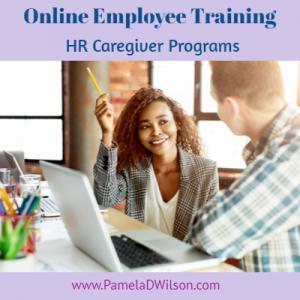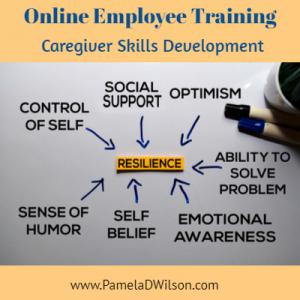Online Employee Training: Caregiver HR Programs
Online employee training sponsored by HR departments can provide caregiver skills training and development that raises core competencies in the workplace.
GOLDEN, COLORADO, USA, July 21, 2020 /EINPresswire.com/ -- Caregiving Programs Deliver Common Goals for HR Departments
Online employee training and development, benefits, and wellness human resource managers may have different goals. These goals can be combined by offering caregiver support programs in the workplace to increase employee engagement and build core competencies.
Do you have an employee wellness program that isn’t hitting the mark? Do you realize that you have an employee caregiver problem, but you don’t know how to sell the need for a caregiver awareness, education, and program to upper management? Are you losing valuable employees because they resign positions to care for elderly parents?
Caregiving Awareness and Training
Most human resources departments don’t realize that managing care for elderly parents is more easily accomplished when caregiving is viewed similar to managing a project. Implementing a caregiving awareness, training, and feedback loop increase employee participation in wellness programs. Caregiving expert, Pamela D Wilson creates relatable discussions around caregiving, wellness, chronic disease management, self-care, and using workplace skills to manage care for aging parents.
Linking HR training and development to caregiver training programs build upon the skills that employees use in the workplace. Employee participation in retirement savings plans increases as learning occurs about the costs of caring for elderly parents becomes a shock. Awareness about health and lifestyle choices become relevant to discussions about advancing care concerns for elderly parents.
Relevance Is the Key to Combining HR Programs and Goals
Talking about caregiving in the workplace brings relevance to many areas of life: health and wellness, family relationships, teamwork, project management, saving for retirement, balancing work, and life. While not all employees may currently be caregivers—caregiving is not a role in life that we watch from the rear-view mirror.
After caregiving—many caregivers have 20/20 vision about what they would have done differently. This rear-view mirror perspective arises from juggling work and caregiving combined with coping to make it through the day—all the while hoping to avoid unexpected care situations. The experience is something that only another caregiver can understand.
Caregiving Is Work
Caregiving is a role born from responsibility and duty—but that does not mean the activities are not exhausting. On average, working caregivers spend an additional 20 hours per week, helping elderly parents and family members. When corporations support the personal lives of employees and accommodate caregiving responsibilities—loyalty and retention increase.
A prior employee of Wilson's care management company, The Care Navigator, shares insights into Wilson's employee training program: "Today, I work in a profession where planning and time management are critically important. I frequently find myself relying on tips and techniques I learned from Pamela to stay organized and work efficiently. She taught me to work smart and not just hard."
Wilson is an expert on partnering workplace core competency skills with caregiving. Over her twenty-plus year career, she developed and trained employees in care management and the provision of caregiver skills for the elderly and disabled clients. The core competency skills that employees learned, transferred to personal lives, caring for elderly clients, parents, and future career endeavors.
Caregiving Has No Age Limits or Boundaries
Millennials, raising children and caring for parents, represent about 25% of the self-reported caregiving population. Unlike other generations, the split between male and female caregivers of the Millennial generation is 50/50. Other working adults who see themselves as “helping out” mom, dad, or another family member may not call themselves a caregiver.
Because early caregiving discussions are rare within families, working caregivers quickly overschedule and overcommit their available time, blurring the boundary between work and personal life. Caregivers report being unprepared for the role and express fear of making mistakes. Much of the information about caregiving on the Internet is general and may be more confusing or unhelpful.
Because of Wilson’s unique experience, she is adept at communicating with caregivers about what she calls the "three-legged stool" related to caregiving —healthcare, financial, and elder law. Her expertise is valuable to caregivers in all stages of providing care to elderly loved ones and negotiating uncharted waters.
Taking Care of Elderly Parents: Stay at Home and Beyond
Wilson’s outstanding digital caregiver program—Taking Care of Elderly Parents: Stay at Home and Beyond—combines human resource management training objectives with practical caregiver skills. No other online caregiver program combines 28 hours of webinars with 24 hours of podcasts to deliver a 52-hour comprehensive program. Time and project management techniques are reinforced as well as the soft skills essential for workplace success. In addition to this caregiving webinar program, Wilson creates webinars and podcasts for licensing and placement on the LMS—learning management systems—of corporations.
Technology Makes Offering HR Caregiver Programs Worry-Free
Gone are the days when on-site presentations were the only way to create HR training and development programs for employees. Wilson also can broadcast live videoconferencing programs for corporations that have video conferencing software.
For more information about caregiving awareness, skills education, and elder care programs for corporations or groups, call Pamela D. Wilson at 303-810-1816 or email Inquiry_For_Pamela@PamelaDWilson.com
P Dombrowski-Wilson
Pamela D. Wilson, Inc.
+1 303-810-1816
email us here
Visit us on social media:
Facebook
Twitter
LinkedIn
10 Things I Wish Someone Told Me About Caregiving
Legal Disclaimer:
EIN Presswire provides this news content "as is" without warranty of any kind. We do not accept any responsibility or liability for the accuracy, content, images, videos, licenses, completeness, legality, or reliability of the information contained in this article. If you have any complaints or copyright issues related to this article, kindly contact the author above.



